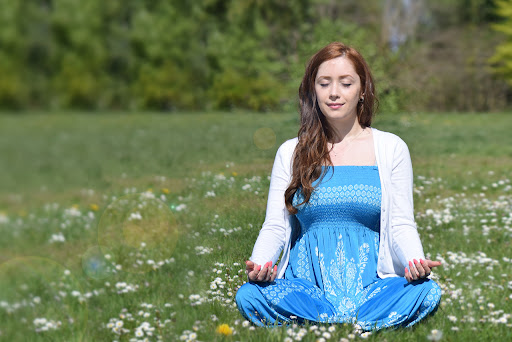What is the point of meditation? To begin, let’s understand the idea behind it. Meditation is an ancient practice of self-cultivation, often depicted as the process of sitting still, calming down, and training one’s mind. Throughout history, people across many different cultures such as ancient India, Europe, and Asia believed that one could connect with otherwise inaccessible, sometimes Divine knowledge through the practice of meditation. Others thought that meditation could confer supranormal powers or longevity and immortality. In any case, meditation was used in spiritual or religious pursuits.
After practicing meditation, many of our worries and frustrations may subside. When our minds are clear and at ease, we are better positioned to understand and let go of the stresses and anxieties of life, more easily detangling ourselves from our attachments and annoyances. In addition, the clarity and calmness of our minds may have a direct bearing on the state of our health. Not only does the practice of meditation purify and soothe our minds, but it also brings our bodies to a state of purity and tranquility.
Meditation practice can enhance our holistic perspective in several ways, including the development of wisdom and inspiration that contribute to increased overall capability, the attainment of liberation (attained by seeing through and letting go), and health benefits from the accumulation of physical energy.

Top 5 Goals of Meditation
In response to the question, “What is the point of meditation?”. The following are some very good reasons to commit to investing your time and energy in the practice of meditation:
1. What is the Point of Meditation – Health
One way in which meditation might serve to improve physical health is by lowering blood pressure and stress levels. High blood pressure causes the heart to work harder to pump blood, which may lead to the heart not functioning well. The development of atherosclerosis, known as a narrowing of the arteries, is another risk factor for cardiovascular diseases involving heart attack and stroke when high blood pressure is present.
However, meditation can reduce blood pressure by relaxing the nerve impulses that regulate heart function, blood vessel strain, and the “fight-or-flight” response that heightens vigilance in stressful circumstances.
2. What is the Point of Meditation – Happiness
All of us want to live lives that are happy and rewarding. Many of us try to find fulfillment in things like developing relationships, career advancement, or public acclaim. While this strategy may be successful when circumstances are going our way, it sets us up for failure when our happiness relies on factors outside our control. When we’re healthy one day, we’re sick the next. We’re madly in love one day, then not the next.
But we can only find genuine, long-lasting happiness inside ourselves. Regular meditation can help boost our positive energy, bringing not only great benefits to our physical health but better mental health and more positive, relaxed emotions. Meditation provides us with the means to understand the truths of life, humanity, and enlightenment, freeing us from the need to depend on external circumstances for our sense of contentment and well-being.
3. What is the Point of Meditation – Mental Clarity
Better self-awareness, understanding, and mental clarity can result from practicing meditation. As meditation techniques such as visualization can guide our body and mind to relax, calm down, and practice stillness, we can gain greater insight into our inner world, and subsequently, the world around us – including the people we interact with and the situations we encounter in our daily lives.
Feeling like you’re stuck in a rut or that your thoughts are always going in circles? Through meditation practice, you may discover fresh perspectives that change the way you think and bring some mental clarity to your otherwise exhausted minds. The regular practice of meditation may be associated with enhanced creative problem-solving abilities.
As you begin to notice and critically examine thoughts that may be damaging to you or self-defeating via other forms, you can start to consciously choose to think in more constructive perspectives. When you cultivate a deeper awareness of your thinking patterns, you can begin to better direct those patterns toward more beneficial habits.

4. What is the Point of Meditation – Positive Energy
Have you ever noticed how your thoughts may become more negative at night or when you are sleepy, yet how, on the weekends or when you are on vacation, you can feel cheerful for no apparent reason? If you’re finding it challenging to think positively, sometimes all you need is some time to yourself to refocus your thoughts and recharge your energy.
We can improve ourselves and boost our energy levels by maintaining a regular meditation practice. As our energy levels rise, we may also enjoy improvements in our overall health, mood, and ability to think more positively and clearly. If the energy inside us is high and positive, we experience happiness and a sense of peace as a whole.
According to the principles of Traditional Chinese Medicine, a lack of vital energy may be the root cause of even certain physical ailments. Deficiencies in Qi may cause various symptoms, including but not limited to insomnia, persistent tiredness, cold hands and feet, and even poor digestion.
Similarly, a propensity to constantly complain, engaging in self-blame and blaming others, chronic anxiety or worry, being fearful, easily becoming angry, having a pessimistic outlook on life in a broad sense and chronic procrastination are all examples of psychological disorders that may be linked to a lack of positive energy.
Having positive energy, on the other hand, can pave the way for being cheerful, grateful, and appreciative, keeping oneself and those around oneself happy, being enthusiastic, being focused, having better awareness, and being confident.
5. What is the Point of Meditation – Enlightenment
Enlightenment or awakening may be the pinnacle of meditation practice in the Buddhist tradition. This implies understanding the real nature of reality and human experience, putting a stop to suffering (dukkha), and coming to a point where the patterns of death, rebirth (samsara), and suffering are broken.
Some people’s conceptions of enlightenment lead them to believe that the point of meditation is to achieve a constant state of serenity or happiness by isolating oneself from one’s thoughts and emotions. Yet, the process of meditating is more complex than that. Rather than retreat from the world and its complexities, enlightenment requires a deep and profound understanding of the nature of human experience, as well as the fundamental causes and solutions to human suffering.
To learn more about Buddhism and meditation, check out our free online lecture series called “Explore the Realm of Buddha.”
How to Start Meditation Practice?
Once you have a better understanding of what is the point of meditation, it is time to begin the practice itself. If you are interested in systematically learning about Buddhism and meditation in a welcoming, supportive community, you are more than welcome to join us at Bodhi Meditation. Throughout the course of the year, Bodhi Meditation offers a variety of classes, retreats, and services that are beneficial to both the body and the mind. Get in contact with your local Bodhi Meditation center today to start your meditation practice!

